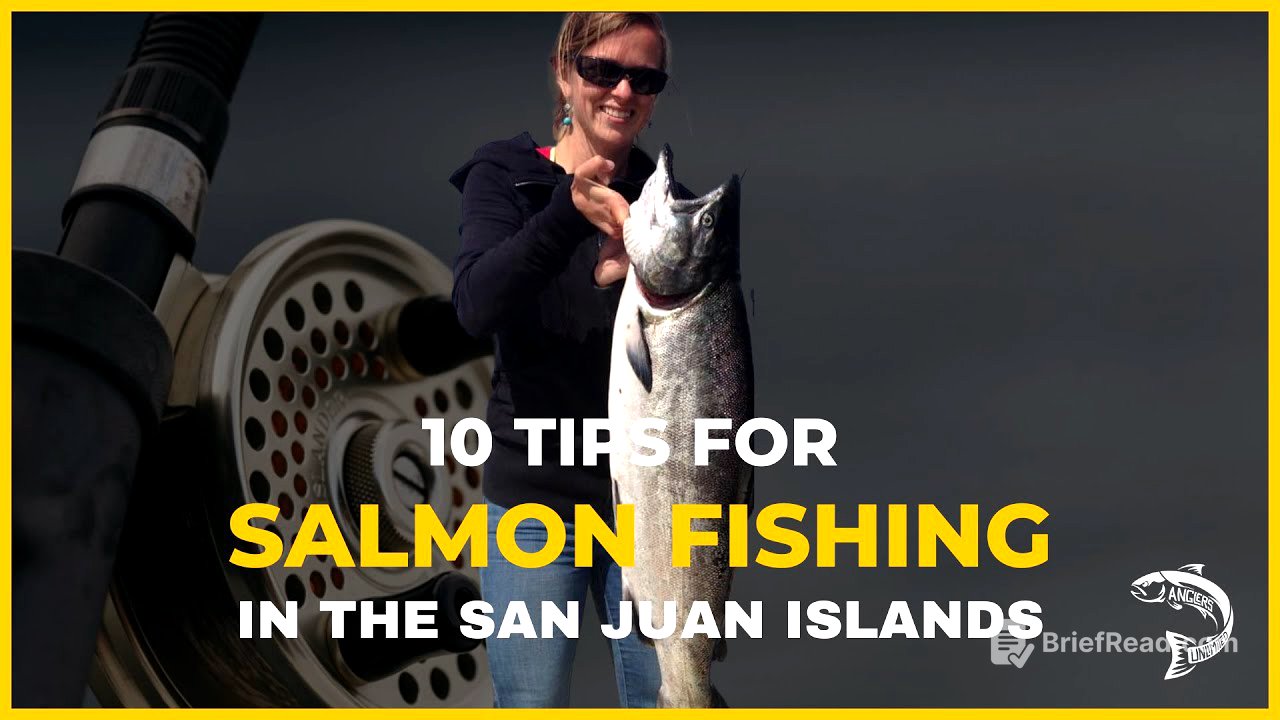TLDR;
This podcast episode by Anglers Unlimited provides ten tips for successful Chinook salmon fishing in the San Juan Islands. It emphasizes preparation, understanding local conditions, using electronics effectively, selecting the right tackle, and respecting regulations. The guide encourages anglers to focus on the experience, learn from others, and stay informed about current rules to ensure ethical and sustainable fishing practices.
- Prepare gear and plan trips based on tides and currents.
- Use electronics to locate fish and trust the data.
- Choose tackle based on confidence and conditions.
- Respect regulations and stay updated on changes.
- Focus on the overall fishing experience and community.
Intro [0:00]
Jamie Props, the founder of Anglers Unlimited, introduces a discussion about Chinook salmon fishing in the San Juan Islands, highlighting it as a personal favorite. The aim is to provide useful tips for both novice and experienced anglers to improve their success and enjoyment in the Puget Sound area. Salmon fishing is described as challenging yet rewarding due to the numerous variables involved, making a successful catch particularly satisfying.
Set Up for Success [3:02]
Setting up for success before leaving the dock is crucial. Anglers should organize their gear, ensuring everything is ready for immediate use upon arrival at the fishing spot. This involves preparing rods and reels, checking lines for damage, and pre-selecting the initial bait or lure. Maximizing line time is key to increasing the chances of catching salmon.
Plan the Perfect Trip [4:40]
Planning the perfect trip involves understanding tides and currents. The San Juan Islands' waters can behave like a river, influencing fish behavior. Knowing whether the tide is flooding (coming in) or ebbing (going out) is essential, as certain spots are more productive during specific tidal conditions. Additionally, understanding the current's speed helps anglers choose locations where they can effectively troll, with slower currents often being more productive.
Use Your Instruments [7:03]
Using electronic instruments effectively is important for locating fish. Properly calibrated electronics can detect fish by identifying the air-filled swim bladder. Anglers should ensure their equipment is correctly adjusted to avoid missing fish marks. Once the instruments are dialed in, it's crucial to trust the data they provide, using it to decide when to move to more promising locations.
Tackle Talk [9:01]
The discussion covers bait and lure selection, noting that the most frequently used tackle often yields the best results. Hardware is recommended for its ease of use and reliability, while bait requires more finesse in rigging and frequent checks to ensure it's fishing effectively. The speaker shares a preferred bait setup using a JDF hood with locking wire and small orange label Herring, emphasizing the importance of a tight, bullet-like spin. Fluorocarbon leaders and quality bead chains are also recommended for their durability.
Don't Chase Boats [14:08]
Anglers should avoid chasing other boats and instead stick to their initial plan based on tides, currents, and fishing reports. Changing plans due to seeing other boats can often lead to unproductive fishing. However, if the initial spot shows no signs of fish activity after a reasonable amount of time, it may be wise to consider a backup plan based on local knowledge or reliable reports.
Remember Your Intention [15:26]
It's important to remember the intention behind fishing, which extends beyond just catching fish. Anglers should appreciate the natural beauty of the islands, wildlife, and the quality time spent with companions. When fishing gets slow and frustration arises, focusing on these aspects can enhance the overall experience.
Don't Leave Fish to Find Fish [16:22]
If there are signs of fish in an area, such as others catching fish, anglers should stay and continue fishing rather than leaving to search for a new spot. Sticking to a productive area and maximizing line time increases the likelihood of success. This approach is encapsulated in the saying "stick and stay to make it pay."
Learn From Locals [17:27]
Learning from local anglers and charter boats can provide valuable insights into effective trolling patterns and productive spots. Asking for advice at local tackle shops or marinas can also be helpful. Experienced anglers are encouraged to share their knowledge with newcomers, fostering a supportive fishing community.
Check the Regulations [19:01]
Checking and rechecking fishing regulations is essential, as they can be complex and change frequently. Anglers should be aware of size limits, open seasons, and specific rules for the San Juan Islands. Subscribing to the wdfw email list and using the Fish Washington app are recommended for staying updated on emergency closures and other important information. Fishing legally and ethically is crucial for sustaining the fishery for future generations.








